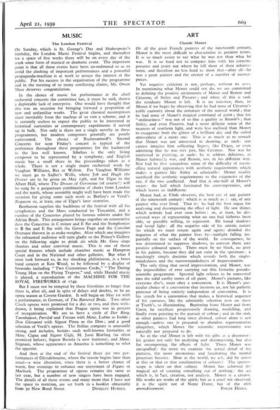M U SIC
The London Festival Os Sunday, which is St. George's Day and Shakespeare's birthday, the London Music Festival begins, and thereafter for a space of five weeks there will be on every day of the week some form of musical or dramatic event. The important point is that all these events have been co-ordinated so as to avoid the clashing of important performances and a powerful propaganda-machine is at work to arouse the interest of the public. For his success in the organisation of the programme and in the meeting of so many conflicting claims, Mr. Owen Mase deserves congratulation.
In the choice of music for performance at the chief orchestral concerts the committee has, it must be said, shown a deplorable lack of enterprise. One would have thought that this was an occasion for bringing forward a proportion of new and unfamiliar works. The great classical masterpieces must inevitably form the nucleus of so vast a scheme, and it is certainly useless to expect the public to be interested in historical curiosities or contemporary experiments if served up in bulk. Not only is there not a single novelty in these programmes, but modem composers generally are poorly represented. The choice of Raclunaninoff's Second Concerto for next Friday's concert is typical of the preference throughout these programmes for the hackneyed to the less well known. Sibelius is the only living composer to be represented by a symphony, and English music has a small share in the proceedings taken as a whole. There is not a single major orchestral work by Vaughan Williams, Bax or Walton. For Vaughan Williams we must go to Sadler's Wells, where 7ob and Hugh the Drover are to be given on May r3th, and for Elgar to the Albert Hall, where The Dream of Geromius (of course!) will be sung by a gargantuan combination of choirs from London and the north, whose assembly might well have been made the occasion for giving some such work as Berlioz's or Verdi's Requiem or, at least, one of Elgar's later oratorios.
Beethoven supplies the backbone of the festival with all his symphonies and the Mass conducted by Toscanini, and a number of the Concertos played by famous soloists under Sir Adrian Boult. This arrangement brings together on consecutive days the Concertos in C minor and E flat and the Symphonies in B flat and E flat with the Grosse Fuge and the Coriolan Overture thrown in as make-weights. After which one imagines the exhausted audience will turn gladly to the Prince's Gallery on the following night to drink ale while Mr. Goss sings shanties and other convivial music. This is one of those special fixtures which include chamber music at Hampton Court and in the National and other galleries. But what I most look forward to, in my shocking philistinism, is a brass band concert at Ken Wood, to be followed by a display of fireworks including "Two Contentious Cocks," "The Daring Young Man on the Flying Trapeze," and, while Handel music is played, a reproduction of the MACHINE FOR THE ROYAL FIREWORKS of rm.
But I must not be tempted by these frivolities to forget that there is, after all, and in spite of delays and doubts, to be an opera season at Covent Garden. It will begin on May 1st with a performance, in German, of The Bartered Bride. Two other Czech operas were promised for a day or two, and then with- drawn, it being explained that Prague opera was in process of reorganisation. We are to have a cycle of Der Ring, Tannhatiser, Parsifal and Tristan with Mme. Lubin as Isolde ; Don Giovanni with Signor Pinza as the Don ; and a good selection of Verdi's operas. The Italian company is unusually strong, and includes, besides such well-known favourites as Mme. Cigna and Signor Gigli, M. Jussi Not-ling (so often promised before), Signor Basiola (a new baritone), and Mme. Stignani, whose appearance as Azucena is something to whet the appetite.
And then at the end of the festival there are two per- formances of Glyndebourne, where the season begins later than usual—a wise alteration, since there is a better chance of warm, fine evenings to enhance our enjoyment of Figaro or Macbeth. The programme of operas remains the same as last year, but a number of new singers have been engaged. The details of all these events and many more that I have not the space to mention, are set 'forth in a booklet obtainable










































 Previous page
Previous page